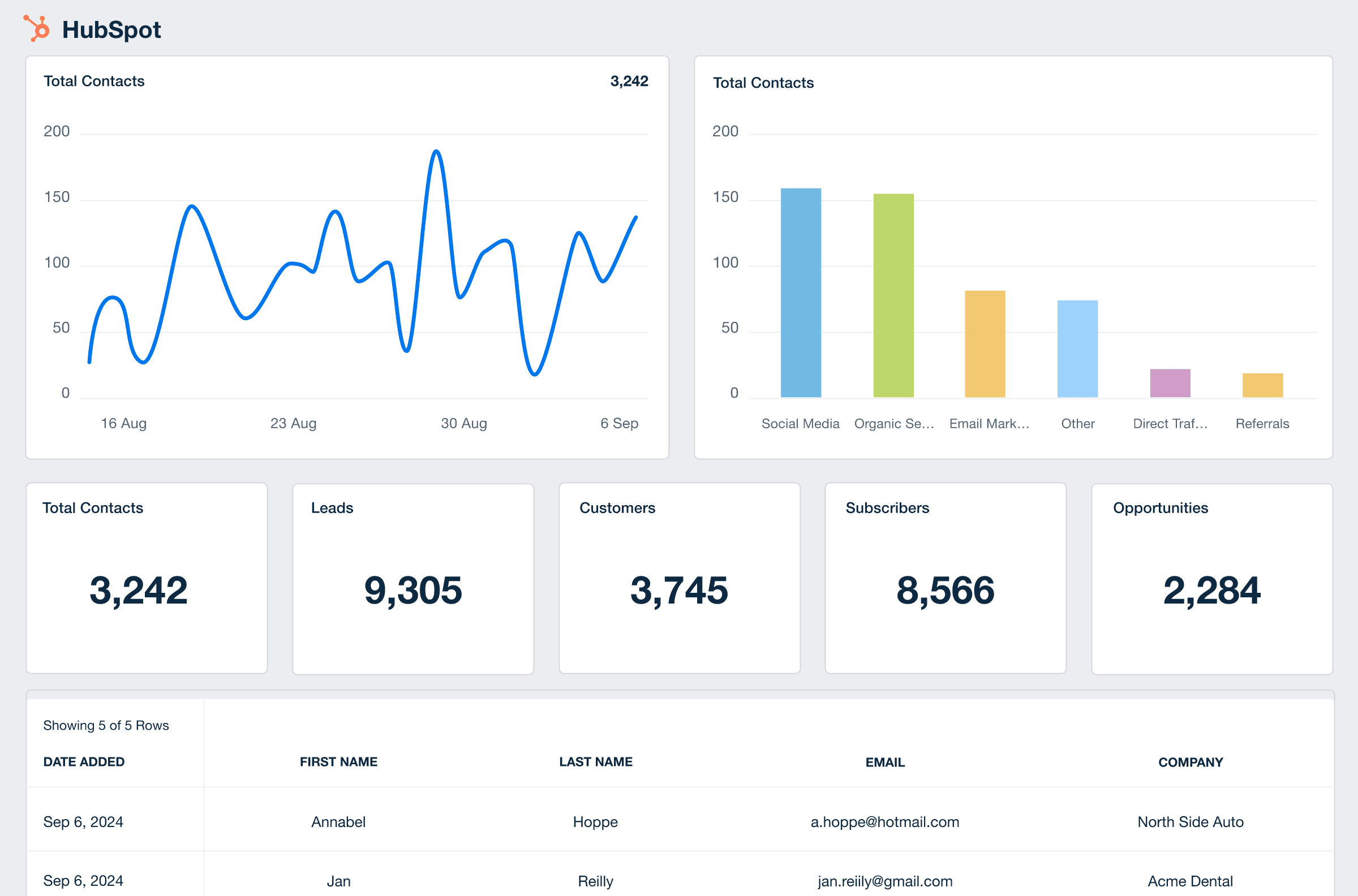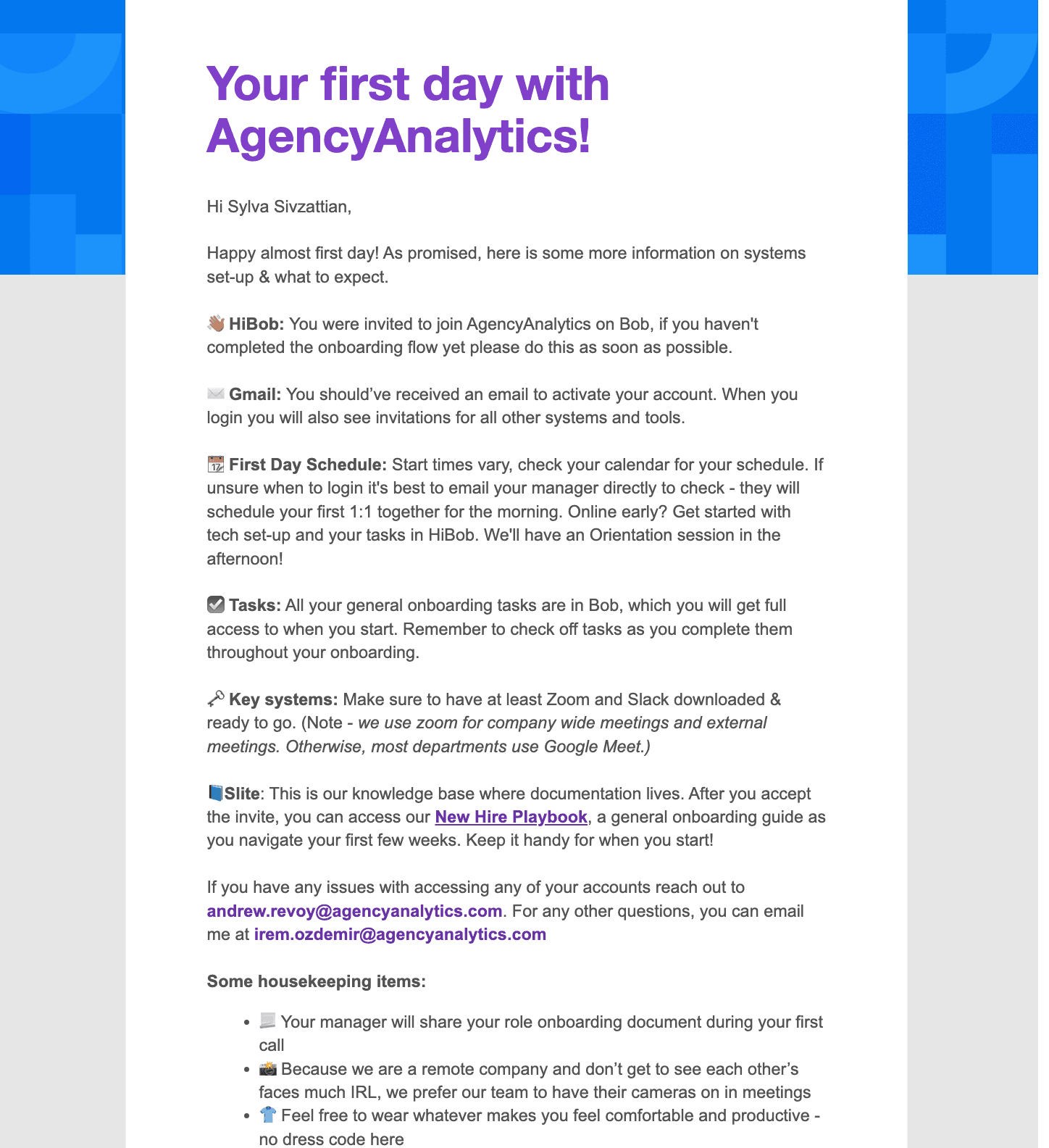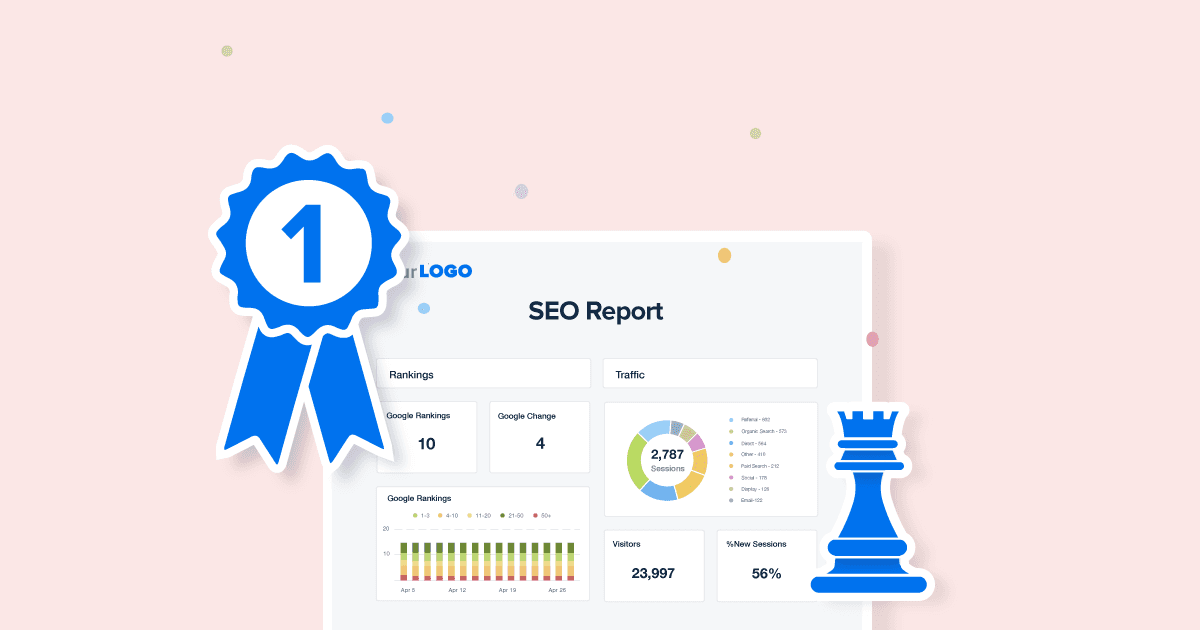Table of Contents
Table of Contents
7,000+ agencies have ditched manual reports. You can too.
Free 14-Day TrialQUICK SUMMARY:
Hiring the right talent isn’t just about meeting immediate project needs—it’s the fuel for scaling your marketing agency. In this article, we outline 7 powerful hiring and recruiting strategies to attract top-tier talent who excel in client work and align with your agency’s growth vision.
Talent is the backbone of every thriving agency. Speak to the head of any top marketing agency, and they’ll quickly praise their talent as the cornerstone of their success. Hiring strong creative and strategic minds isn’t just about delivering standout client results; it’s also key to scaling your agency to new heights.
As your agency grows, hiring and recruiting challenges multiply. How do you attract specialized talent, avoid over-hiring for large projects, and ensure new hires quickly reach their potential? This article covers 7 recruitment strategies to help your agency scale sustainably while sidestepping costly mistakes.
The biggest contributor to our growth is our people. We bring on smart, driven, and talented individuals who align with our North Star of helping people feel proud, prosperous, and connected.
Jessica Weiss, Director of Marketing & Strategic Partnerships, One Firefly
Scaling Smart: 7 Recruitment Strategies for Growing Agencies
As your agency grows, building a strong team is essential for meeting client demands and scaling to the next level. But finding the right talent requires more than just filling open positions—it demands a strategic approach to recruitment that aligns with your agency’s long-term goals. Here are 7 recruiting strategies to help you maintain a competitive edge.
1. Reframe Recruitment as an Investment Rather Than an Expense
When budgets are tight and the team is operating at max capacity, hiring might feel like a risk. The financial and time costs associated with recruitment often cause agencies to postpone or procrastinate on hiring. But avoiding the hiring process at a time when your team is stretched too thin only leads to missed deadlines, overworked staff, and client churn. It also stifles your agency’s growth, as an overstretched team cannot seize new business opportunities.
To overcome this fear, it’s helpful to shift your mindset to view recruitment as an investment in client satisfaction rather than a cost. It’s also important to note the difference between hiring and recruiting to take the right approach. A hiring process is reactive, focusing on filling immediate project needs. A recruitment strategy, on the other hand, involves taking the time to find qualified candidates to enhance your agency’s key capabilities and align with company culture.
If your agency hasn’t employed hiring managers, consider working with a specialized recruiter to tap into a strong talent pool of potential candidates. Recruitment agencies leverage niche job boards to find qualified talent and also excel at attracting passive candidates. As Brad Russel, Director of Digital Hitmen, suggests, partnering with recruitment agencies can make all the difference in landing qualified applicants.
We hired a recruitment agency that helped us find and hire four full-time staff members who are still with us today. The agency has proven to be a very valuable resource to us, and it’s the best decision I’ve ever made. These employment agencies do the hard work for you. They filter through the lower-level candidates and only present the high-level ones to you.
Brad Russel, Director of Digital Hitmen
2. Hire Proactively Rather Than Reactively
Many agencies adopt the "accordion" hiring mode—growing for big clients and shrinking once projects end. While this approach may seem cost-effective initially, it’s a different story when you consider the detriments to company culture. A volatile work environment prone to turnover only disrupts company culture and erodes your reputation as a stable employer. Attracting top talent becomes much more difficult, and core staff members might leave.
To avoid understaffing or overstaffing, start by tracking your team’s capacity. Use time-tracking tools to understand how your team allocates time between client work and internal tasks. When your agency’s utilization rate reaches 85-90% of client work, it’s clear that it’s time to get new people through the door.
Forecasting tools or workforce planning tools offer valuable insight into your client pipeline to time your hires effectively. Analyze the flow of upcoming projects and lead certainty—high, medium, or low—to determine the best time to hire. Proactive hiring based on these insights helps your agency grow sustainably rather than by reacting to short-term capacity issues.

Track agency growth using the AgencyAnalytics HubSpot integration. Drag-and-drop the metrics that matter most into a white labeled dashboard–try it free today for 14 days.
3. Choose Candidates Who Align With Your Agency’s Vision
Building an effective hiring strategy requires evaluating more than just skill sets; it’s about understanding candidates' competencies and long-term career aspirations.
When hiring a PPC manager, look for deep expertise in platforms like Google Ads, combined with strong budgeting and data analysis skills to drive successful campaigns.
For an account manager, prioritize not only client relationship skills but also their ability to keep cross-functional teams aligned and focused.
For executive and leadership roles, alignment with your agency’s long-term vision is key. Look for candidates with the strategic insight to propel your agency’s goals forward over time.
Agency Tip: It’s important to ensure that all new hires' career aspirations align with your agency’s growth trajectory. For roles involving high client interaction or strategic leadership, look for candidates whose ambitions match your agency’s future direction. If you’re expanding your creative department, hire someone with experience scaling creative output across multiple large clients rather than someone more comfortable working on one-off projects for smaller brands.
By evaluating candidates through multiple lenses, your agency hires talent not just to fit its roles but to contribute to the impact of your agency’s work and its scalability.
Impress clients and save hours with custom, automated reporting.
Join 7,000+ agencies that create reports in minutes instead of hours using AgencyAnalytics. Get started for free. No credit card required.
4. Build an Agency Brand That Attracts Top Agency Talent
Recruiting is no longer about simply posting job openings and waiting for candidates. Today, it’s about selling your company’s culture, values, and opportunities to stand out in a crowded market. With job seekers looking for more than just a paycheck, investing in recruitment marketing helps your agency attract the right talent that aligns with your vision.
In a world where burnout is becoming more common, and people wear 60-hour weeks on their sleeves like a medal of honor, to attract top talent, you need to offer something different.
Steve Andrews, CEO, She Reigns Creative
Start by building a strong employee value proposition that reflects your agency’s culture, flexibility, and creative opportunities. Incorporate your employee value proposition into your job descriptions, emphasizing unique benefits such as remote work, career growth, and a diverse client base of exciting brands to leave an impact on.
Since 1 in 10 hires now come from social media, capitalize on your social media channels to show interested candidates what work life is like behind the scenes. Lastly, showcase the exciting projects your team is working on. This tactic will not only attract job seekers but also help your agency stand out as an innovative place to work.
5. Develop a Comprehensive 12-Week Onboarding Program
Signing contracts is only the beginning– the fast-paced nature of marketing agencies means new hires need to get up to speed quickly.
Without a solid onboarding process, your agency risks wasting resources on avoidable issues, whether through access issues to key tools, a lack of documentation on SOPs, or clarity about role expectations. A strong employee onboarding program ensures employees receive complete guidance on their roles, and team processes, so they can hit the ground running.
At AgencyAnalytics, we provide new hires with comprehensive onboarding documents that include key information, such as primary contacts for troubleshooting, relevant SOPs, and a tailored 30-60-90 day plan specific to their role. These documents are invaluable for boosting productivity by giving new employees a clear roadmap of their responsibilities and goals.
The 30-60-90-day plan sets specific milestones for the first three months, helping new hires understand precisely what’s expected from them and what success looks like at each stage. By eliminating ambiguity and offering structured guidance from day one, these onboarding materials enable new hires to quickly become productive team members, contributing to overall agency success.

Another tip is to use the onboarding process to help new hires understand how their roles fit into your agency’s larger mission. New employees should know how their work impacts client success, drives revenue, and contributes to the agency’s growth. Without this understanding, employees may feel disconnected, which could lead to high turnover rates.
A well-structured onboarding plan with a 12-week runway ensures new employees quickly adapt to your processes, transforming them into productive, engaged team members.
For more tips on employee onboarding, use this employee onboarding checklist to ensure success.
6. Build An Enticing Employee Referral Program
Once you’ve built an environment where employees understand company culture, client needs, and the types of candidates that will thrive, they become excellent sources for qualified referrals. An employee referral program strengthens your agency’s ability to attract top talent by tapping into your team’s personal networks.
Offering a referral bonus motivates your team to participate. A typical bonus ranges from $500 to $2,000, depending on the role's level, with higher amounts reserved for harder-to-fill positions. This incentive encourages employees to bring in high-quality candidates while lowering recruitment costs since referred candidates often require less screening and are quicker to hire.
Referred employees also tend to stay longer at a company, with retention rates up to 45% higher after two years compared to employees hired through other channels. This is because they come with a built-in endorsement from a trusted colleague. To maximize the success of your referral program, ensure it's well-promoted within the agency and make submitting referrals as simple as possible.
7. Consider Remote Work in Your Agency’s Recruitment Strategy
If your agency operates on a remote or hybrid model, adjust your recruiting strategies to attract the right talent. First, broaden your search beyond local candidates to tap into a global talent pool. Remote work allows you to hire highly specialized talent that may not be available locally, providing your agency with a competitive edge.
Additionally, during the recruitment process, be clear about remote work expectations. Highlight the flexibility your agency offers and emphasize the need for self-management and strong communication skills.
Implementing assessments or project-based tasks during the interview process will help you evaluate how well candidates will perform in a remote setting. These strategies help you recruit talent that thrives in a remote environment and contributes to your agency’s success.
Remote onboarding lacks organic, in-office opportunities for team bonding and collaboration, so creating intentionally structured touchpoints is essential. At AgencyAnalytics, we expect new hires to schedule 15-minute one-on-ones with peers in key roles to better understand how different organizational functions work together. Consider setting up virtual mentorship programs where experienced team members guide new hires through their first few months, helping them integrate smoothly into the company's culture and workflow.
Another tip is to use digital tools to track progress and maintain regular check-ins. Remote employees may feel isolated without the right level of support; scheduling weekly or bi-weekly video meetings ensures they have the opportunity to ask questions and get feedback, which helps maintain productivity and engagement.
The Takeaway
Whether it’s refining your recruitment marketing and job postings, creating a solid onboarding program, or leveraging employee referrals for the first time, these hiring and recruiting strategies will help you attract top talent and position your agency for ongoing success in a time when competition for talent is fierce. By proactively seeking candidates that align with your agency's culture and long-term goals, you’ll build a team that delivers exceptional client results while supporting sustainable growth.

Written by
Sylva is an expert content writer with over 10 years of experience in tech and SaaS, offering first-hand insight into agency needs from her background in advertising.
Read more posts by Sylva SivzattianSee how 7,000+ marketing agencies help clients win
Free 14-day trial. No credit card required.






